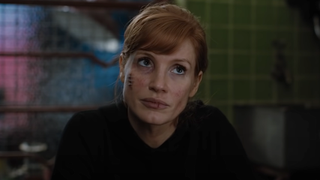Interview: The Debt Director John Madden On Jessica Chastain And Unusual Ex-Nazis

The Debt is a double-edged sword of a vengeance thriller that tells two sides of an intense hunt for a former Nazi war criminal, and will appeal to those who left Steven Spielberg’s Munich wishing Hollywood would make more films of that ilk. Oddly enough, it was Debt director John Madden’s Shakespeare In Love that upset Spielberg’s bid for a Best Picture Oscar with Saving Private Ryan, so maybe this espionage thriller is equal parts payback and homage.
Set in both 1997 and 1966, the story – derived from Assaf Bernstein’s 2007 film of the same name – follows three Mossad secret agents on the trail of Dieter Vogel (Jesper Christensen), the notorious ex-Nazi nicknamed “The Surgeon of Birkenau” who has been on the lam since the end of WWII. Madden has stocked both time periods with fine talents--Helen Mirren, Tom Wilkinson and Ciaran Hinds play the conflicted trio in the “present” day, while the younger versions of the Mossad agents are played by Sam Worthington, Marton Csokas and “It” girl Jessica Chastain … who wasn’t quite the hot commodity when Madden first cast her nearly two years ago.
It is with Chastain where I began my discussion with Madden, who called to discuss historical hunts for war criminals, the physicality of his actresses and their contributions to The Debt.
You show us a side of Jessica Chastain which we haven’t seen yet in films like Terrence Malick’s The Tree of Life or Tate Taylor’s The Help, and that’s this physical, steely component tucked into her acting arsenal. Can you elaborate on the physicality of the Rachel character, because both Jessica and Helen Mirren, who plays older Rachel, find themselves in brutal fights scenes, and you don’t appear to be interested in pulling any punches.
Well, I was blessed with two actresses who were completely up for that. And I will stress that everything you see in those scenes was performed by the actresses concerned. I did shoot a version of the Vogel-Rachel fight with stunt performers, but it only lasted a moment before I realized, “OK, we’re not going there!” Instead, the actors did their own stunts, so what you see is exactly what happened.
Both ladies are very disciplined, and they are both fearless. Jessica did a huge amount of work. She trained in Krav Maga, which is a martial arts technique that is used quite widely as a fitness technique in Los Angeles. So she’d gotten herself quite fit for the role and thought, “Well, I’ve never raised an arm to anybody in anger. I better learn how to do this, otherwise I’m never going to convince anybody.”
The Jessica “situation” is an extraordinary one, because I cast her before any of these other movies had been made, with the exception of Terrence Malick’s film, which was in its second or third year of gestation at that point.
CINEMABLEND NEWSLETTER
Your Daily Blend of Entertainment News
That’s very funny.
No, no. I didn’t mean that dismissively. I admire his willingness to do that, just to let a film marinate like he does. But he was absolutely clear to me about what her qualities were, and we spoke at length about what she offers. And I had wanted to cast an unknown, because I wanted an unknown person to turn into Helen Mirren rather than a very famous actress trying to turn into Helen Mirren, which I thought would be a distracting element for the film and would not be useful. So now, she is unknown, I think in the sense that I didn’t want her to carry a lot of baggage, and I think, strangely, she still doesn’t, even though she’s emerging, as I knew she would, as an extraordinary talent. Her ability to disappear into what she is doing, the sense that she knows equally how to play the slightly desperate, Southern failure that she plays in The Help as well as the different roles she plays in The Tree of Life and this just demonstrates a highly intelligent actress who can transform herself. And that’s an unusual thing to see in film, because people usually are enshrined in certain qualities so that the film world can cast her in the same role again and again. There are only a half a dozen actresses you can name who won’t be pinned down in that way, and you can spot them very clearly. I think she belongs in that company.

While the “Surgeon of Birkenau” didn’t exist, this story you tell in The Debt certainly has ample grains of truth sprinkled throughout it. There are similarities to the actual hunts for Nazi war criminals such as Aribert Heim and Adolph Eichmann. Did you read up on those accounts and educate your cast on those cases?
Yes, absolutely. And because elements of the Holocaust are in the public domain, we’d all done our own reading and research into the history. The Eichmann kidnapping is obviously the point of departure for our story, and I certainly availed myself of that account. Now, Heim is “Doctor Death,” isn’t he?
That’s right. And he also was posing as a gynecologist when he was discovered.
Well, that’s a weird one. To be absolutely honest with you, I never did have a chance to ask Assaf Bernstein and Ido Rosenblum, who wrote the original Israeli film Ha-Hov, on which this is based, if they thought of him. I was not aware of him at first but did become aware of him as we were shooting, because the New York Times did publish an article about him, focusing on the fact that he’d survived for several decades in Cairo, I believe, before they uncovered papers proving his existence. But that was a startling revelation to me, that he practiced as a gynecologist in Baden-Baden for 15 years after the war. And I think I was actually gratified to hear that because clearly that is quite a big ask, in a way. [Laugh] That is quite a challenge for us to accept that concept. Because we were very concerned that we’d always bury the film in a scenario that was as real as we could make it. And when I say “real,” I don’t mean that it is based on something that actually happened. I mean “real” in terms of how we think people might behave in a certain circumstance, because ultimately, the film is about behavior. It is a very human narrative. Obviously it’s about big subjects and it takes place against a big backdrop. Most crucially, it’s a genre piece, a thriller. But at the core of it, I was very concerned that we didn’t bend characters around corners to get them to cooperate with a plot.
Also, in a film like this, we start to question how we would respond if placed in a circumstance like this.
Precisely. That’s exactly where the heart of the film is for me. When you are in a circumstance, if you can pull an audience into an identification with characters and, with this particular case, with opposing points of view, even to the point as I’m sure an audience watching might assume, “Well, have they got the right man?” You respond. It’s not fun watching somebody being force-fed. The guy hasn’t necessarily had a chance to state his case by that point. And mistakes had been made, and so on and so forth, so you find yourself thinking those things. Even though he’s a reported war criminal, the Dieter Vogel character had some concerns that I think we all can relate to. He keeps asking about his wife, which again is well documented that it was the only thing on Eichmann’s mind when he was captured. So that seems to me to create an interesting circumstance, and you find yourself having to have to take a position on what you feel about certain things, and people start behaving in ways that you wish that they hadn’t … especially those who you think to be the heroes of the story.

Sean O’Connell is a journalist and CinemaBlend’s Managing Editor. Having been with the site since 2011, Sean interviewed myriad directors, actors and producers, and created ReelBlend, which he proudly cohosts with Jake Hamilton and Kevin McCarthy. And he's the author of RELEASE THE SNYDER CUT, the Spider-Man history book WITH GREAT POWER, and an upcoming book about Bruce Willis.
Most Popular






